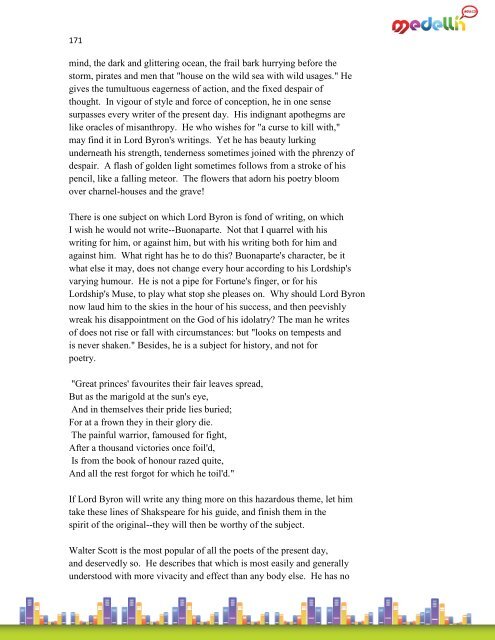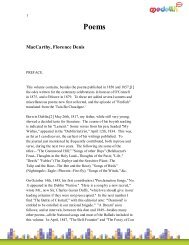Lectures On The English Poets William Hazlitt
Lectures On The English Poets William Hazlitt
Lectures On The English Poets William Hazlitt
You also want an ePaper? Increase the reach of your titles
YUMPU automatically turns print PDFs into web optimized ePapers that Google loves.
171<br />
mind, the dark and glittering ocean, the frail bark hurrying before the<br />
storm, pirates and men that "house on the wild sea with wild usages." He<br />
gives the tumultuous eagerness of action, and the fixed despair of<br />
thought. In vigour of style and force of conception, he in one sense<br />
surpasses every writer of the present day. His indignant apothegms are<br />
like oracles of misanthropy. He who wishes for "a curse to kill with,"<br />
may find it in Lord Byron's writings. Yet he has beauty lurking<br />
underneath his strength, tenderness sometimes joined with the phrenzy of<br />
despair. A flash of golden light sometimes follows from a stroke of his<br />
pencil, like a falling meteor. <strong>The</strong> flowers that adorn his poetry bloom<br />
over charnel-houses and the grave!<br />
<strong>The</strong>re is one subject on which Lord Byron is fond of writing, on which<br />
I wish he would not write--Buonaparte. Not that I quarrel with his<br />
writing for him, or against him, but with his writing both for him and<br />
against him. What right has he to do this? Buonaparte's character, be it<br />
what else it may, does not change every hour according to his Lordship's<br />
varying humour. He is not a pipe for Fortune's finger, or for his<br />
Lordship's Muse, to play what stop she pleases on. Why should Lord Byron<br />
now laud him to the skies in the hour of his success, and then peevishly<br />
wreak his disappointment on the God of his idolatry? <strong>The</strong> man he writes<br />
of does not rise or fall with circumstances: but "looks on tempests and<br />
is never shaken." Besides, he is a subject for history, and not for<br />
poetry.<br />
"Great princes' favourites their fair leaves spread,<br />
But as the marigold at the sun's eye,<br />
And in themselves their pride lies buried;<br />
For at a frown they in their glory die.<br />
<strong>The</strong> painful warrior, famoused for fight,<br />
After a thousand victories once foil'd,<br />
Is from the book of honour razed quite,<br />
And all the rest forgot for which he toil'd."<br />
If Lord Byron will write any thing more on this hazardous theme, let him<br />
take these lines of Shakspeare for his guide, and finish them in the<br />
spirit of the original--they will then be worthy of the subject.<br />
Walter Scott is the most popular of all the poets of the present day,<br />
and deservedly so. He describes that which is most easily and generally<br />
understood with more vivacity and effect than any body else. He has no

















